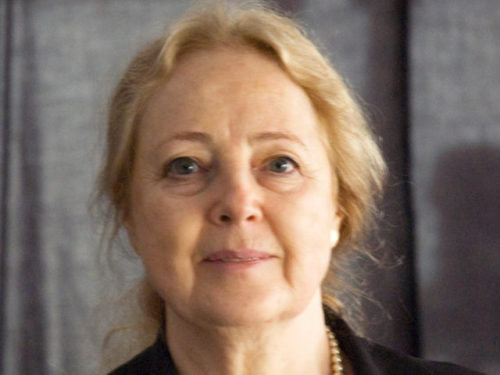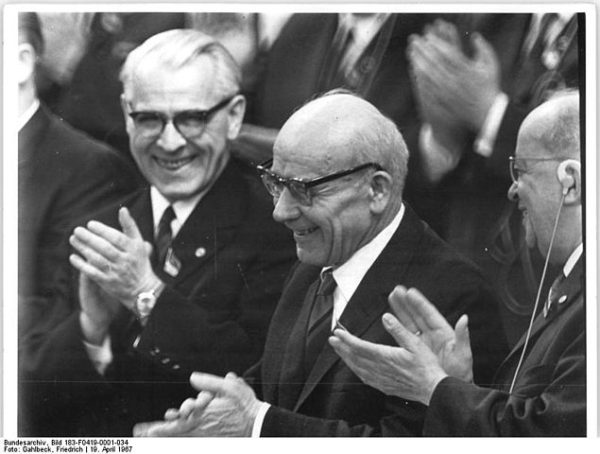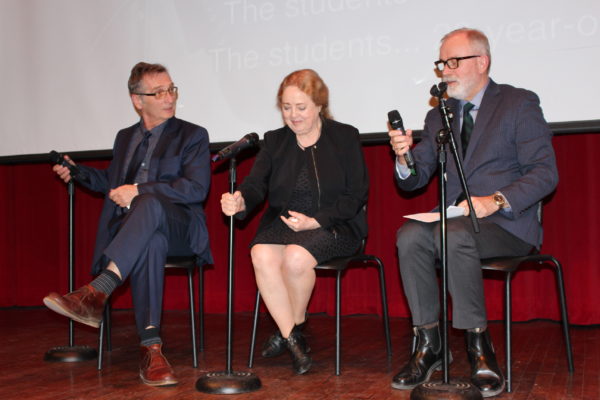Irena Grudzinska-Gross was one of the leaders of the Polish student protest movement that ignited one of the most shameful episodes in Poland’s postwar history.
Speaking in Toronto on March 26, she claimed that the state-sponsored antisemitic campaign in Poland from 1967 to 1968 cannot be separated from the mass murder of three million Polish Jews by the Nazis during the Holocaust. “It’s really unbelievable that Jews were chased out of Poland, only 23 years after the Holocaust,” she said in comments marking the 50th anniversary of the Polish government’s antisemitic purge that led to the emigration of some 13,000 Jews from Poland.

Grudzinska-Gross, here at the invitation of The Konstanty Reynert Chair of Polish History at the University of Toronto and the Polish-Jewish Heritage Foundation of Canada, spoke after an excerpt from a 2008 Polish documentary, The Ordinary March was screened. The film, featuring the Polish Jewish journalist and former student leader Adam Michnik, is a caustic exploration of the turmoil that convulsed Poland five decades ago.
The evening’s program was dedicated to the late Henry Dasko of Toronto. A student activist, literary critic and businessman who left Poland in 1968, he was a co-founder of the Polish-Jewish Heritage Foundation of Canada.
The chain of events that caused the flight of Jews from Poland began 1967 with the outbreak of student demonstrations in Warsaw protesting the closure of a play about Poland’s loss of independence to Russia in the late 18th century. Interpreting the play as anti-Russian, the Communist authorities shut it down, sparking non-violent nation-wide protests by students accusing the government of suppressing free speech.
Several of its leaders, including Grudzinska-Gross, were of Jewish descent.
A few months before the eruption of the student demonstrations, the Six Day War in the Middle East broke out. In accordance with the anti-Israel policy of the Soviet Union and its Warsaw Pact allies in Eastern Europe and the Balkans, the Polish government accused Israel of flagrant aggression and severed diplomatic relations with the Jewish state.

In a speech that sent tremors through the Jewish community, Wladyslaw Gomulka, the secretary-general of the Polish Communist Party, suggested that Jews were partial to Israel and disloyal to Poland. He likened them to Fifth Columnists.
Historians generally believe that Gomulka’s antisemitic diatribe was partially triggered by an internal struggle within the Communist Party. Still other observers maintain it was the latest installment of anti-Jewish animus in Poland.
The accusations against Jews, the vast majority of whom were communists assimilated into Polish society, snowballed in 1968 and had devastating consequences. Jews were dismissed from their jobs and encouraged to leave the country.
Grudzinska-Gross, hailing from a thoroughly secular family, was arrested in 1967 and charged with being one of the coordinators of the protests that shook Poland to its core. She spent six months in prison.
“We were convinced we were acting in the interests of the country,” she said, answering questions from moderators Peter Jassem, the head of the Polish-Jewish Heritage Foundation of Canada, and Piotr Wrobel, the holder of the Konstanty Reynert Chair of Polish History. Wrobel described her as a “witness, participant and victim” of these tumultuous events.

She had hoped the protests would prompt the Polish government to introduce a program of political reforms, but she was bitterly disappointed. Adding to her disillusionment was Poland’s participation in the Soviet bloc invasion of Czechoslovakia in August 1968. Grudzinska-Gross is convinced that the turmoil that rocked Poland in 1967 and 1968 spelled the beginning of the end of the four-decade Communist era in Poland.
Feeling vulnerable as an activist and a Jew, she decided to emigrate. She took a train to Vienna and then waited in Rome for a U.S. visa while she continued her studies. At the University of Warsaw, she had studied French. In 1982, she received a PhD from Columbia University in New York City. Formerly a research scholar at Princeton University, she is now a professor in the Institute of Slavic Studies of the Polish Academy of Science in Warsaw.
She is the author of several books, notably Golden Harvest, which she co-wrote with her former husband, Jan Gross, a Polish American historian living and teaching in the United States. He has written books ranging from Neighbors: The Destruction of the Jewish Community in Jedwabne, Poland to Fear: Antisemitism in Poland After Auschwitz.